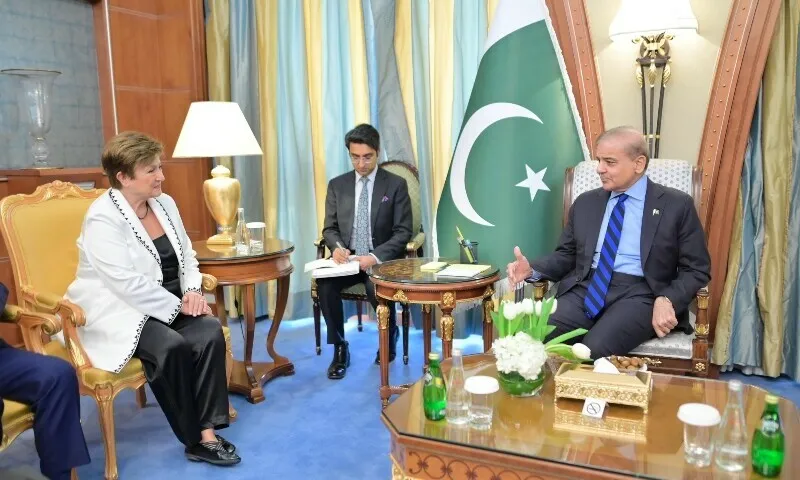Islamabad, April 05: The International Monetary Fund (IMF) has dispatched a second Corruption and Governance Diagnostic Mission to Pakistan within a short span, deepening its engagement with more than 30 government departments and institutions — including the registrars of the Supreme Court and the accountability court.
According to official sources, the mission commenced its meetings on Thursday and will remain in the country until April 14.
At the time of reporting, the IMF had not issued a formal statement explaining the rationale behind initiating a second governance-focused mission since February.
Insiders revealed that price regulation policies, especially those linked to the sugar and construction sectors, are also under the IMF’s scrutiny as part of its ongoing review.
Initial discussions have already been held with the State Bank of Pakistan (SBP) in Karachi, where matters related to banking regulation, detection of suspicious transactions, and anti-money laundering mechanisms were on the agenda.
This marks the IMF’s second governance mission to Pakistan in recent months, designed to finalize a comprehensive report alongside a series of recommendations to address corruption vulnerabilities, strengthen institutional oversight, and enhance transparency.
During its February visit, the mission met with Chief Justice of Pakistan Yahya Afridi to deliberate over the judicial appointment process and broader legal reforms.
Registrar of the Supreme Court
Sources indicate that the current mission will meet the registrar of the Supreme Court to examine issues of judicial efficiency and judge accountability.
Separately, a session is planned with the registrar of the accountability court in Islamabad to review the court’s operational structure.
Meetings with officials from the Ministry of Law and Justice are also scheduled, though a formal comment from the law minister was pending at the time of filing.
Read More: IMF Delegation on Reforms, Corruption Arrives in Pakistan
During its 12-day visit, the IMF plans to engage with over 30 public entities, including anti-corruption agencies in Punjab, Sindh, and Khyber Pakhtunkhwa (K-P).
Pakistan Sovereign Wealth Fund Act
Interestingly, some of the mission’s planned discussions extend beyond traditional anti-corruption themes.
For instance, amendments to the Pakistan Sovereign Wealth Fund Act — previously part of a standard IMF program review — are now under review within this governance mission.
In addition, the Fund will address issues related to budget execution, treasury single accounts, and public debt management.
Discussions on treasury single accounts will encompass topics such as the number of accounts held by government ministries, cash forecasting practices, and the coordination of debt management — topics typically reserved for fiscal policy reviews.
At the time of writing, Ministry of Finance spokesperson Qumar Abbasi had not issued a response regarding the expanded scope of the mission’s agenda.
The IMF is also set to meet with the Ministry of National Food Security to explore issues within the sugar sector, including long-standing price controls that critics argue have disproportionately benefited sugar mills at the expense of consumers and competitive market dynamics.
The Pakistan Sugar Mills Association (PSMA), which has faced multiple investigations by the Competition Commission of Pakistan (CCP), will also be consulted.
The CCP has fined the PSMA and several sugar mills a combined total of Rs44 billion over price manipulation and cartelisation — penalties currently under stay orders by the courts.
The IMF is expected to seek updates from the CCP regarding legal proceedings and referrals to higher judicial forums.
Anti-money laundering (AML), and counter-financing of terrorism (CFT)
Further meetings will focus on financial sector oversight, including the SBP’s supervision, anti-money laundering (AML), and counter-financing of terrorism (CFT) frameworks.
Topics such as regulator integrity, potential conflicts of interest, and legal protections for supervisory authorities will also be addressed.
The mission aims to review the licensing process for commercial banks and evaluate the criteria used to assess the suitability of their board members and top executives.
Engagements are also planned with the Federal Investigation Agency (FIA) and the National Accountability Bureau (NAB).
The IMF intends to review anti-corruption investigations, risk assessments, and reform priorities with NAB, in addition to evaluating progress in money laundering prosecutions.
Procurement fraud prevention and anti-corruption measures within the SBP and financial sector institutions will also be key discussion areas. A separate session is scheduled with the Financial Monitoring Unit (FMU).
The mission will also delve into the Right of Access to Information — a governance concern where implementation has remained weak due to bureaucratic reluctance in providing public access to data. Enhancing transparency in this area remains a top priority.
The IMF is expected to compile and release a detailed diagnostic report following the conclusion of this mission. Pakistan will be required to publish the final report by late July or early August, as per the agreement with the Fund.









